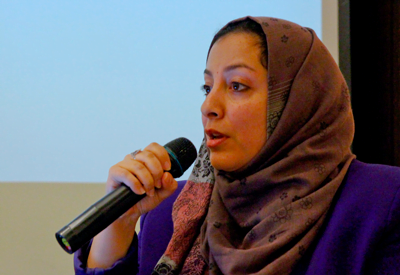On Monday, 13 March 2017, the 61st Session of the Commission on the Status of Women (CSW61) begins in New York. Each year WILPF supports women from conflict-affected areas around the globe to participate in the annual session and bring attention of the international community to their experiences. But this year is different. Women from several countries will not be present at the CSW61 due to the US travel ban, and neither will WILPF.
The purpose of the CSW is to document the reality of women’s lives throughout the world, to promote women’s rights and to shape and affect global standards on gender equality and women’s empowerment. But this year, the very foundation and purpose of the CSW are being compromised and challenged due to the travel ban enforced by the US Administration.
The (latest) travel ban is directed towards citizens from Iran, Sudan, Libya, Somalia, Syria and Yemen. These are war-torn and conflict-affected countries, where peace, freedom and human rights are matters of uttermost importance. These are countries, where the voices of women and minorities need to be heard.
As time passes, it becomes clear that women from several other countries have been denied visas and thus been denied the opportunity to let their voices be heard at the CSW. This is in stark contrast to the whole purpose of the CSW. This limits the CSW’s legitimacy to document the realities of women’s lives worldwide and empower women.
This is why WILPF International is not attending the CSW this year. Women need to speak for themselves. None should be allowed to speak for them. By not formally engaging in the CSW, WILPF protests the absence of those women peace activists who have become victims of discriminatory immigration policies – and stands in solidarity with them.
Silencing women has consequences

Rasha Jarhum from Yemen is just one woman out of many who are not welcome in the US due to the travel ban. She was supposed to attend the CSW61 as part of WILPF’s delegation. But as a Yemeni citizen she is now banned from entering the country. Asking Rasha Jarhum about what she had wanted to share with the UN, Member States and fellow activists, she explains that she intended to talk about the situation of women in Yemen, to share their suffering and illuminate why Yemeni women should not be marginalised and excluded from decision-making processes. Jarhum is convinced that her words at the CSW could have made a difference. She says:
“It could’ve shaped policies of development partners and donors towards focusing their funding on women instead of the arms trade. It could’ve improved the platforms for meaningful participation of women to have a say in their future and the future of their communities.”
Rasha Jarhum was part of the delegation of WILPF partners from Yemen, Libya and Syria going to the CSW61. The delegation was supposed to bring to the surface the security concerns and priorities of women in these countries and to launch the preliminary findings in a new, not yet released, study on women, peace and security in Yemen and Libya. The study is produced in partnership with WILPF and is based on local consultations with women leaders, activists, and internally displaced persons conducted by WILPF’s partner organisations. The planned and booked side event is now cancelled as most of the delegation, including Rasha Jarhum, can no longer enter the US.
Another member of the delegation was Milia Eidmouni, Regional Director of the Syrian Female Journalists Network. As a Syrian journalist, she was planning to enrich the discussion by bringing a Syrian perspective to the panel discussion. Additionally, she would also have been a panelist on a panel organised by another partner organisation of WILPF, the Lebanese organisation ABAAD. At the CSW61, ABAAD will launch the report: “Negative: Refugee Women from Syria in the Lebanese Media – A mapping study of the broadcast and print media coverage of refugee women’s issues from the lens of UNSCR 1325” also produced in partnership with WILPF.

It goes without saying that Milia Eidmouni will not be on that panel either. In a video interview with WILPF – see above – she explains that she was planning to use her work and expertise to foster the engagement of the international community to ensure that women are part of negotiation processes and that host countries implement their national plan on providing refugees with more security and protection.
Women’s participation is key ingredient in achieving peace
The travel ban is essentially discriminatory. But the fact that the US Administration’s travel ban predominantly targets citizens from conflict-affected areas might have severe consequences for the possibility of achieving peace in these countries. As Jarhum says, “a visa to the US opens a lot of doors because it is where global policy is made and shaped.” Being denied access to the US and thus the UN thereby means being denied access to these exact processes.
Such approach is totally illegitimate. Women’s participation is both relevant and important when it comes to achieving sustainable peace.
“Women’s meaningful participation is the most important and overlooked ingredient for sustainable peace, and it is essential to ensure that the UN decision-making processes fulfill their purpose,” writes WILPF Secretary General, Madeleine Rees, in her recent Huffington Post’s blog on “Women’s meaningful participation: The Missing Ingredient at the CSW61.”
The travel ban and visa restrictions for women from several countries thus contribute to silencing voices that need to be heard.





